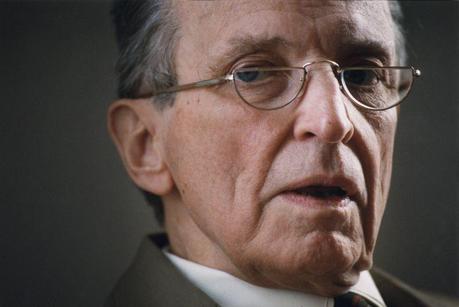
Having enjoyed Morte D'Urban, I've moved on to Wheat the Springeth Green, J.F. Powers's second and last novel. It was published in 1988, the year he turned 71, which was also 25 years after Morte D'Urban won the National Book Award. For his fans, Powers's small output is kind of disappointing, though, on the other side, it makes it relatively easy to hold in the brain for fondling his widely spaced offerings. The publishing history is a book a decade for five decades--one collection of stories (Prince of Darkness) in the 1940s, another (The Presence of Grace) in the 1950s, Morte D'Urban in the 1960s, a third story collection (Look How the Fish Live) in the 1970s, and then Wheat that Springeth Green in the 1980s.
I don't know how Powers worked or how long it took him to write Wheat that Springeth Green. It seems axiomatic that most writers, having won the National Book Award for their first novel, would get a second one into print before a quarter of a century had elapsed. According to his New York Times obituary, Powers was disappointed by the sales of Morte D'Urban, which reminds me of Thoreau's rueful comment after he acquired from his publisher 706 unsold copies of his first book from the original run of 1000: "I have now a library of nearly 900 volumes, more than 700 of which I wrote myself."
Possibly the short story was more natural to Powers, for Wheat that Springeth Green sometimes seems less like a continuous narrative than a series of stories from various stages in the life of Father Joe Hackett. I see that the page containing the publication information in my Washington Square Press paperback says, "Portions of this work were originally published in The New Yorker," and I can imagine that subscribers didn't suspect that they had just read one chapter of a work in progress. Anyway, I'm not criticizing: Wheat that Springeth Green is approximately as enjoyable as its predecessor.
In both these novels, Roman Catholic clergy are simultaneously the object of satire and of the author's evident profound sympathy. If that sounds impossible, I can only say try reading them, because how Powers manages to pull it off is a mystery to me and probably an aspect of artistic genius. At least for me, it's hard not to think of current events while reading these books, which may in a way possess a kind of explanatory power--the human flaws, the mediocrity coexisting with self-satisfaction and a sense of entitlement: a combustible mix. But the weaknesses of Powers's priests are balanced perfectly with their humanity. He taught English literature at St John's University, at Collegeville, Minnesota, for years, and one feels for his priests something like what one feels for Chaucer's Canterbury pilgrims: it's easier to say that you love them than that you approve of them.
For Minnesotans, there is once again a local angle to appreciate. Like Father Urban, Father Hackett is a sports fan serving a parish in Minnesota, and watching Twins games on TV, or listening to them on the radio, is a favorite pastime. Sometimes a rained out ballgame is the occasion for Father Hackett to prosecute a priestly duty, such as pouring himself a stiff one before getting out a catalog to shop for some new office furniture. The baseball details are as perfect as all the others. At one point, Father Hackett thinks to himself, while the Twin are losing another one, that it's surprising that this is pretty much the same team that won the pennant just three years earlier. The astute reader will then know that current time for this section of the novel is the summer of 1968, since the Twins won the pennant in 1965 (and finished the 1968 season in seventh place, with a sub-.500 record, 24 games behind the Tigers). Here's another passage:
[Joe] returned to the study and poured half of the beer--more than half--into Father Felix's glass. "Hey. How'd that man get on second?"
Father Felix observed the television screen closely and nodded, as if to say yes, Joe was right, there was a man on second.
"The official scorer has ruled it a single and an error, not a double," said the announcer.
"Who made the error?" Joe said, more to the announcer than to Father Felix.
"According to our records, that's the first error Tony's made this season," said the announcer.
"What's so wonderful about that?" Joe said to the announcer. "He's an outfielder."
This detail concerning "Tony" who made the error is like an overheard and forgotten whisper dropped by chance into the narrative, but longtime Twins' fans will know that it refers to Tony Oliva, the team's all-star right fielder in the late 60s.
